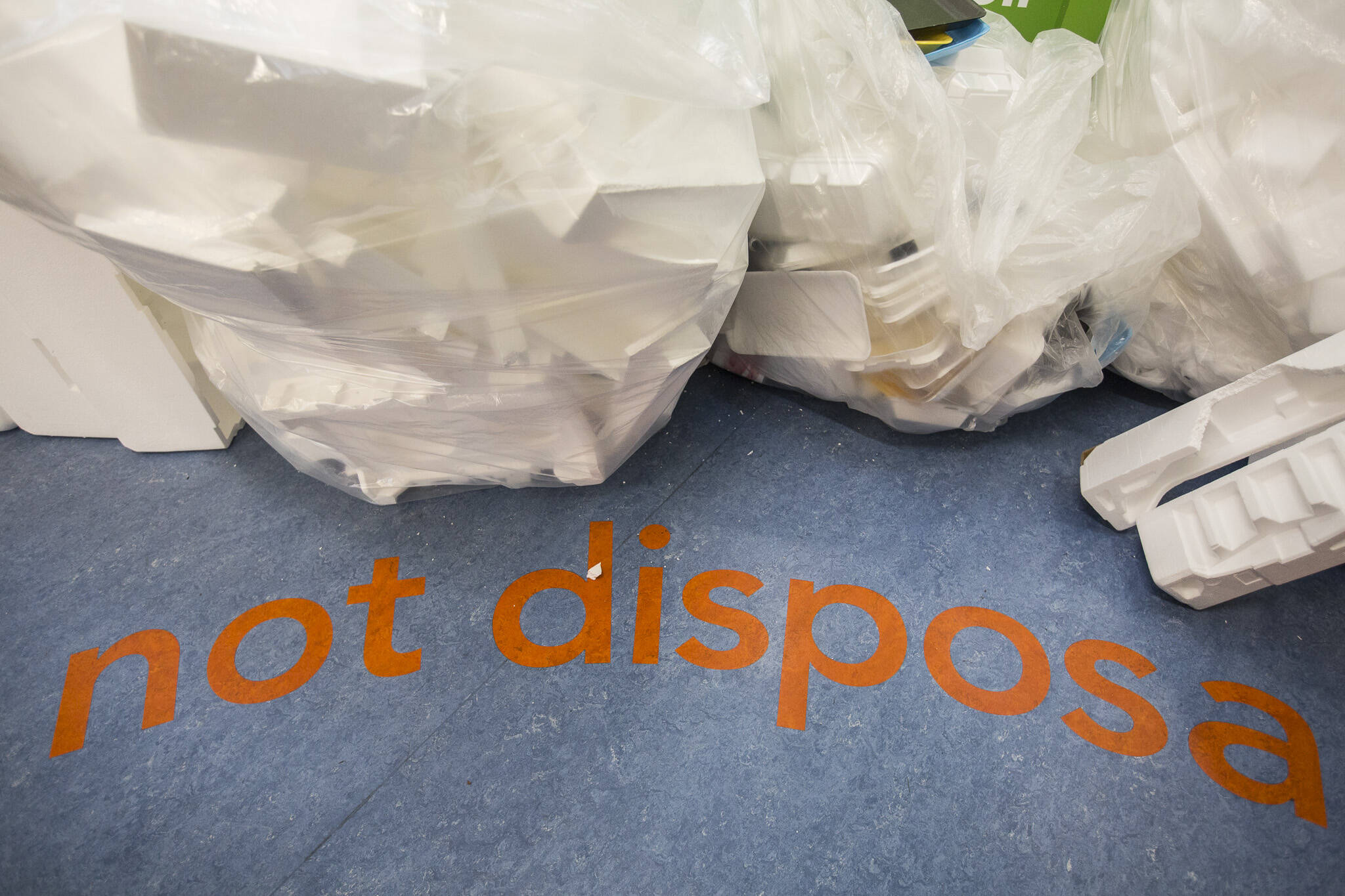EVERETT — Over the past four years, the state Department of Ecology has enforced a series of laws to reduce plastic pollution: banning single-use plastic bags in 2021, restricting businesses from automatically providing single-use serviceware (lids, straws and silverware) to customers in 2022 and banning foam packing peanuts in 2023.
And last month, Ecology began regulating a new law preventing the sale and distribution of foam plates, bowls, cups, clam shells, coolers and trays, otherwise known as expanded polystyrene items.
Certain items are exempt from the ban:
• Foam blocks;
• Trays for raw, uncooked or butchered meat, fish, poultry, seafood, vegetables and fruit;
• Egg cartons; and
• Foam containers for drugs and medical devices.
But it’s still too early to determine the success of these laws, according to local and state waste experts.
Snohomish County Litter Wranglers frequently find now-banned foam products and plastic bags on local roads, said Dave Schonhard, the solid waste director for the county. The crew doesn’t collect data on the volume of littered items. Cascadia Consulting Group found an estimated 127,000 pounds of single-use plastic bags and 11,000 pounds of expanded polystyrene items, according to a 2022 statewide litter study.
Especially in the summer months, with drivers rolling their windows down, plastic bags and foam products easily fly out of cars. Locals can help dramatically reduce plastic waste by securing their loads, Schonhard said.
Several Everett restaurant employees said the recent expanded polystyrene ban doesn’t affect operations.
Manufacturers tend to sell foam clamshells, trays and other serviceware at cheap rates, according to Ecology.
But Jackson Quall, owner of The Sisters Restaurant on Grand Avenue, said he hasn’t considered the cost. He only purchases paper and clear plastic clamshells, continuing what former owners did when he took over the business in 2021.
“They look better and they’re better for the environment,” he said.
Artisans Books & Coffee on Hewitt Avenue already avoids foam products, too. When customers want food to go, staff hand out paper cups, trays and compostable paper bowls, said barista Anthony Brock.
For over a year, Ecology staff have educated manufacturers about the expanded polystyrene law. Still, many business owners in Western Washington have leftover stock of these foam products, said Heather Church, the Ecology implementation lead for the ban.
Ecology officials won’t issue penalties immediately to those who violate the law.
“What we want to know is when did you buy those and who sold them to you?” Church said. “It’s the producers and manufacturers that we need to hold in tow. We don’t want to punish a local business that has no idea about this.”
The state only plans to issue fines to companies if they repeatedly continue distributing foam products after initial outreach from Ecology. A business could receive up to a $250 penalty for its first offense and a $1,000 fine for repeat violations.
As of this month, Ecology hadn’t issued any fines for its single-use plastic bag, or expanded polystyrene, bans since Washington first started implementing plastic laws in 2021. The state hadn’t issued any penalties regarding single-use serviceware restrictions either.
“That means that we’ve gained voluntary compliance on the enforcement processes that we do have,” Church said, “which rely heavily upon those reporting to us when they see items out there that still shouldn’t be out there.”
When someone notifies Ecology of a violation, Church sends an educational letter to the business, informing them about the ban. Church requests owners call her, too, so she can explain how to legally dispose of remaining foam items.
“Businesses are often very eager and want to be in compliance,” Church said.
Businesses that are part of larger chains can send leftover stock to out-of-state locations where expanded polystyrene products are still legal. Companies can also recycle packaging peanuts, foam clamshells, plates and other foam materials for free at Styro Recycle in Kent. Styro Recycle only accepts clean, dry products free of any labels or tape.
Curbside waste collection companies typically don’t accept foam products because they’re brittle and contaminate other recyclables.
Owners can bundle remaining foam products in a plastic bag and throw them away, as well.
Ecology’s Language Access team provides owners educational materials in their preferred language and hires interpreters to assist with in-person or phone conversations. Businesses can email civilrights@ecy.wa.gov to enroll in the free services.
Ecology doesn’t have a specific recommended alternative for foam products, but suggests businesses refer to New York state’s guide to see what options are available. Starch packing peanuts, for example, can replace foam ones since they dissolve in water.
Still, Western Washington curbside waste collection companies rarely recycle plastic clamshells — a common replacement for foam clamshells. Waste facilities can more easily sell items made with thicker plastic, like peanut butter jars and detergent containers, rather than thin plastic items like clam shells.
Waste Management, or WM, doesn’t accept plastic clamshells for curbside recycling. Republic Services does. Some manufacturers turn plastic clamshells into fabric or carpet.
As of last week, Church had received 50 tips about violations of the new expanded polystyrene ban across the state.
“We’ve had probably just as many, if not more, direct emails that are proactive from businesses,” Church said, with owners explaining they’re aware of the ban and want to know how to proceed.
Every week, Ecology gets tips on plastic bag violations.
Church encourages restaurant owners and manufacturers to reach out with any questions or concerns about the ban at heather.church@ecy.wa.gov or 509-688-5358.
To report suspected violations, email epsban@ecy.wa.gov.
Ecology asks reporters to detail:
• The business name and address;
• Location, date and time of the witnessed violation;
• And any photos of the banned items in use.
Ta’Leah Van Sistine: 425-339-3460; taleah.vansistine@heraldnet.com; Twitter: @TaLeahRoseV.
Talk to us
> Give us your news tips.
> Send us a letter to the editor.
> More Herald contact information.

























